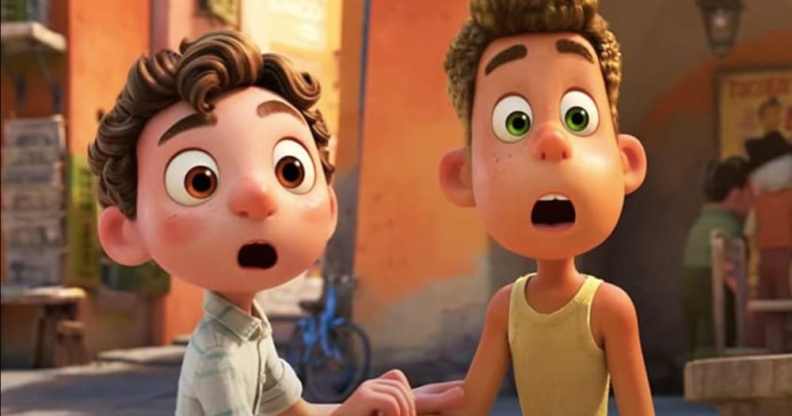Fans think Disney’s beautiful new film Luca is a moving allegory for queerness and coming out

Luca has some fans debating whether the film is ‘queer coded’. (IMDb)
Luca, the literal fish-out-of-water Pixar movie, was never intended to be a queer film – but fans are certainly seeing it that way.
Set in a 1950s Italian village, Enrico Casarosa’s feature-length debut is a whimsical tale about a young aquatic creature who, upon stepping onto dry land, changes into a human.
The title character soon meets Alberto, a rebellious fellow sea monster who lives on a rocky island. The pair bond and end up running to a nearby fishing village when Luca’s parents threaten to send him away “to the deep” for going up to the surface.
It’s an all too familiar story for queer folk – a tale of a world-cracking friendship, feeling different and a life-changing summer.
After the film dropped on Disney Plus on Friday (18 June), countless viewers were quick to see the two boys hiding their sea monster identities as an allegory for being LGBT+. Some even comparing it to Call Me by Your Name which sees a teenager and a man find love in the craggy shores and warm sunsets of Italy.
#Luca is one of the most beautiful queer-coded films i’ve ever seen. it perfectly captures the feeling of the best friend you’re kinda in love with as a young gay kid, the confusion, the fear of being different & hiding.. despite it using sea monster metaphors to do it. 1000/10!! pic.twitter.com/KDUxKUlNju
— kari⁷ (@blysmanors) June 18, 2021
I loved #Luca with all my heart and soul. Such a gorgeous story about embracing what makes you different. Watching this will help queer children and any outsiders feel seen. Easily the best @Pixar film since Coco, and it might just be one of my all-time favourites 🥰 #PixarLuca pic.twitter.com/vVuyoDU50F— David Opie (@DavidOpie) June 17, 2021
https://twitter.com/MoonyRiddikulus/status/1406460120758841344
Indeed, fans pointed out just how much the film can be read in a queer way. Luca’s parents bar him from going to the surface, for example, fearful of how his “secret” would be received by the landlubbers who don’t understand.
While Alberto, a wiser boy abandoned by his loved ones, teaches Luca how to “pass” as a human in a town where they feel if they were “outed” they would surely be harassed – or worse.
But users were quick to stress that, no, the film doesn’t feel queer purely because the two main characters are men who hug and show platonic affection for one another.
“It feels queer because the story is about two boys who have a secret about their bodies and how important it is to find people who will accept you for who you are,” one said.
https://twitter.com/its_she_they/status/1406081172258451459
Above all, the film is a story of three kids trying to win a local triathlon competition. There’s a quaint story of acceptance of people who are different tucked in, but as director Casarosa said, Luca is not a “queer film” and the similarities to Call Me by Your Name are all coincidence.
“I love Luca’s movies and he’s such a talent, but it truly goes without saying that we really wilfully went for a pre-pubescent story,” he said.
“This is all about platonic friendships.”
Such a view of queerness – that is sex and nothing more – comes at a time when Disney’s LGBT+ representation has faced increased scrutiny.
Over the years, the studio has taken baby steps when it comes to portraying queer stories. A brief kiss here, a blink-and-you’ll-miss-it dance there and, of course, a lot of allusions to something more.
Disney also found its social media post celebrating Pride Month caught in the firing line as users accused the company of hypocrisy.
“There’s room for everyone under the rainbow,” its tweet read. Not quite, users hit back, with one Disney show writer claiming Disney has “walked back” on much of the progress it has made.

